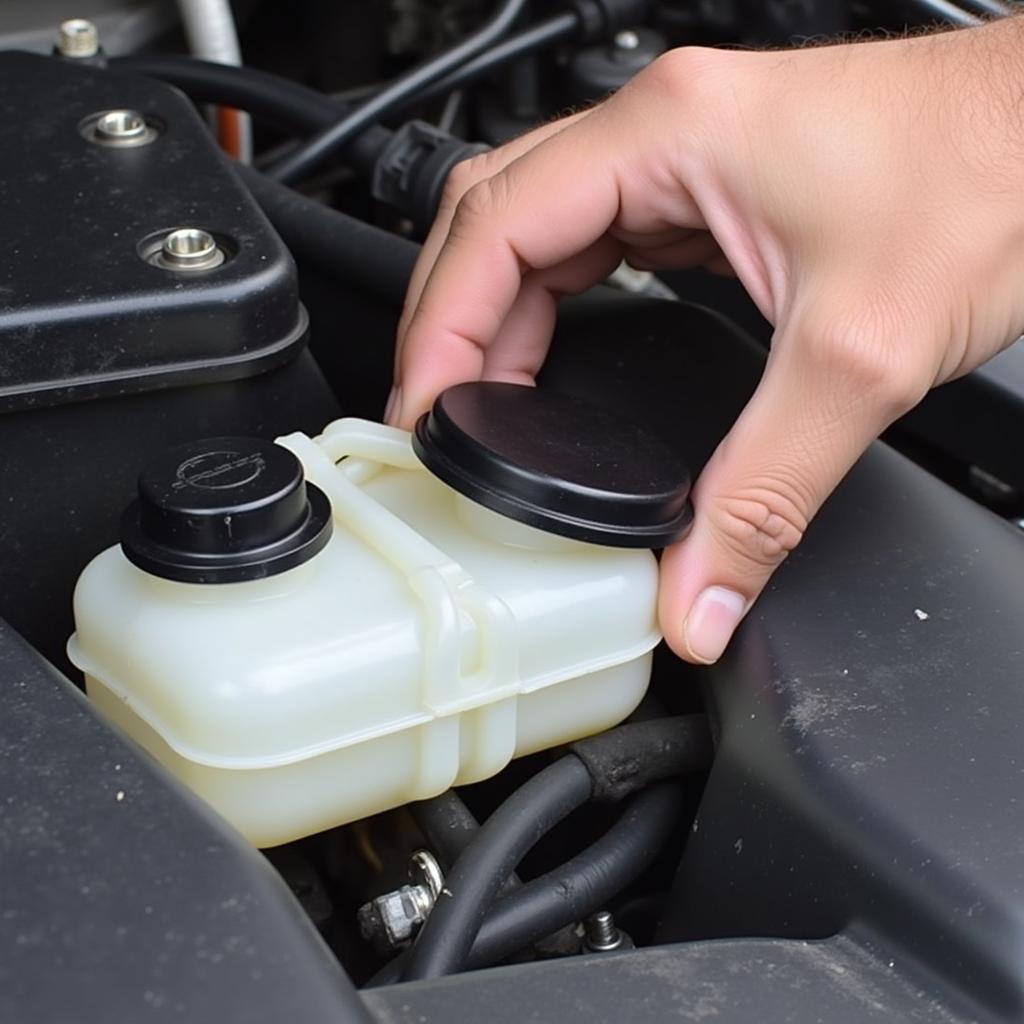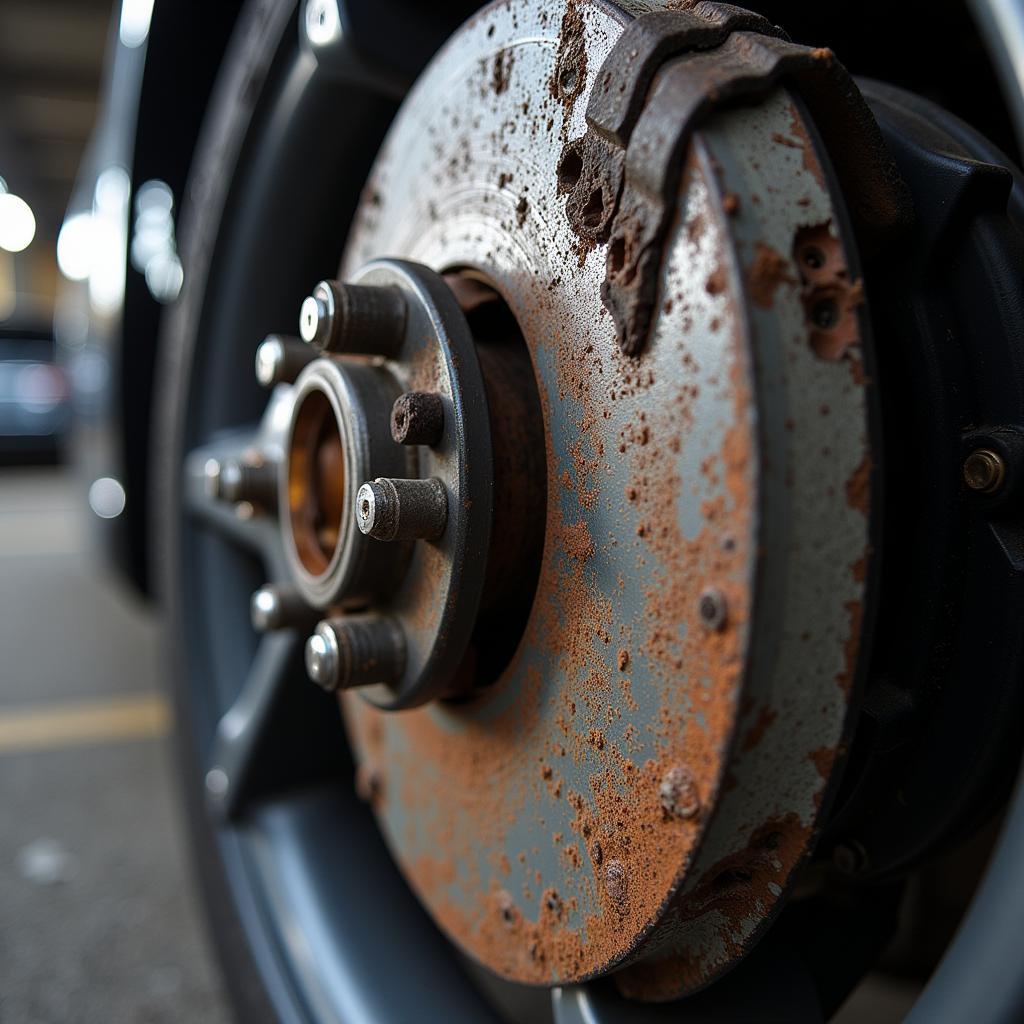A glowing brake pad warning light on your Mercedes dashboard can be an unwelcome sight. It typically means your brake pads have worn down and need replacing. This article will guide you through understanding this warning, what to do, and how to maintain your Mercedes brakes for optimal performance.
Understanding Your Mercedes Brake Pad Warning Light
The brake pad warning light is part of your Mercedes’ sophisticated braking system. It’s designed to alert you about potential issues before they become serious. When the light comes on, it often indicates one of two things:
- Worn Brake Pads: This is the most common reason. Your brake pads have a wear sensor that triggers the warning light when they reach a certain thinness.
- Brake Fluid Level Low: Your brake system relies on hydraulic pressure to function. Low brake fluid can significantly reduce braking power and is a serious safety concern.
What to do when the brake pad warning light comes on?
- Don’t Panic: While a serious issue, a glowing light doesn’t mean your brakes have failed completely. You should, however, address it promptly.
- Assess Your Driving: If the light came on gradually, it likely signals worn brake pads. If it appeared suddenly, especially with other warning lights, it could indicate a more significant problem.
- Check Your Brake Fluid: If you’re comfortable, carefully inspect the brake fluid reservoir under your hood (refer to your owner’s manual for location). Low fluid requires immediate attention.
- Seek Professional Help: The safest course of action is to take your Mercedes to a qualified mechanic specializing in German vehicles.
Why Are My Mercedes Brake Pads Wearing Out?
Several factors can contribute to brake pad wear:
- Driving Style: Frequent hard braking generates more heat and friction, wearing pads faster.
- Driving Conditions: City driving with stop-and-go traffic puts more strain on brakes than highway driving.
- Brake Pad Quality: Higher-quality brake pads are designed to last longer and withstand higher temperatures.
- Vehicle Weight: The heavier the vehicle, the more work the brakes have to do, leading to faster wear.
The Importance of Timely Brake Pad Replacement
Driving with severely worn brake pads is dangerous. Here’s why:
- Reduced Braking Power: Thin pads offer less friction, increasing stopping distance.
- Damage to Rotors: Driving with worn pads can score or damage the brake rotors, leading to costly repairs.
- Brake Failure: In extreme cases, completely worn pads can cause the brakes to fail entirely.
Beyond Brake Pads: Maintaining Your Mercedes Braking System
Regular maintenance is crucial for your Mercedes’ braking system:
-
Brake Fluid Flush: Brake fluid absorbs moisture over time, which can compromise braking performance. Consult your owner’s manual for the recommended brake fluid flush intervals.
-
Brake Inspections: Have your entire brake system inspected annually or as recommended by your mechanic. This includes checking the pads, rotors, calipers, hoses, and fluid levels.
-
Quality Parts: When replacing brake components, opt for high-quality parts designed for your specific Mercedes model.
“Mercedes brake systems are designed for precision and performance,” says master technician Hans Schmidt. “Using OEM or equivalent parts ensures optimal compatibility and safety.”
Remote Diagnostics and Programming: The Future of Mercedes Brake Repair
Advancements in automotive technology are changing how we diagnose and service cars. Remote diagnostics and software programming are becoming increasingly common, even for complex systems like brakes.
-
Remote Diagnostics: Specialized software allows technicians to remotely access your Mercedes’ onboard computer, retrieve diagnostic trouble codes, and identify potential issues with the braking system.
-
Software Programming: Modern Mercedes vehicles rely heavily on software. Remote programming allows manufacturers and certified technicians to update your vehicle’s braking system software wirelessly, ensuring optimal performance and safety.
“Remote diagnostics and programming offer Mercedes owners a new level of convenience and efficiency,” adds Schmidt. “Software updates can address potential issues proactively, often preventing problems before they arise.”
Conclusion
Addressing the brake pad warning light on your Mercedes promptly is essential for your safety and the longevity of your vehicle. Regular maintenance and utilizing the latest remote diagnostic and programming technologies can help keep your Mercedes braking system in top condition for miles to come. Remember, when it comes to brakes, a proactive approach is always the safest and most cost-effective solution.


